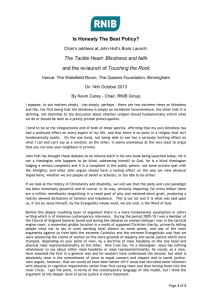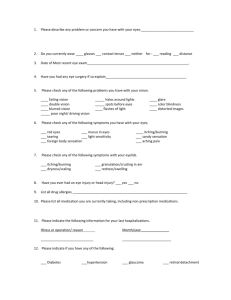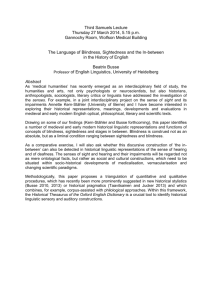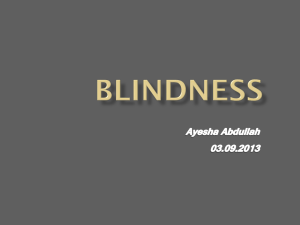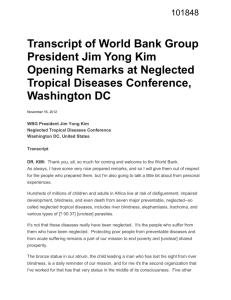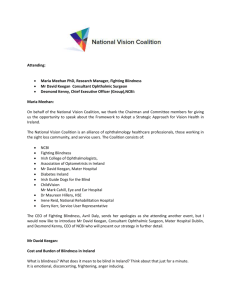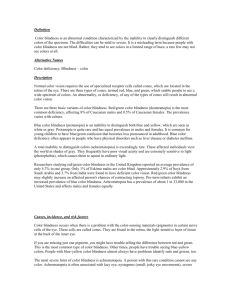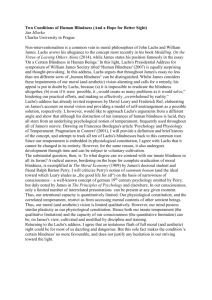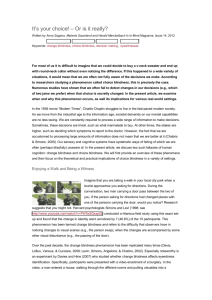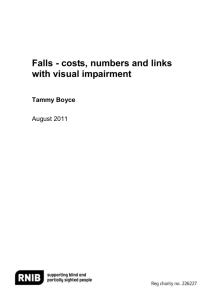Book Launch Kevin Carey Address
advertisement
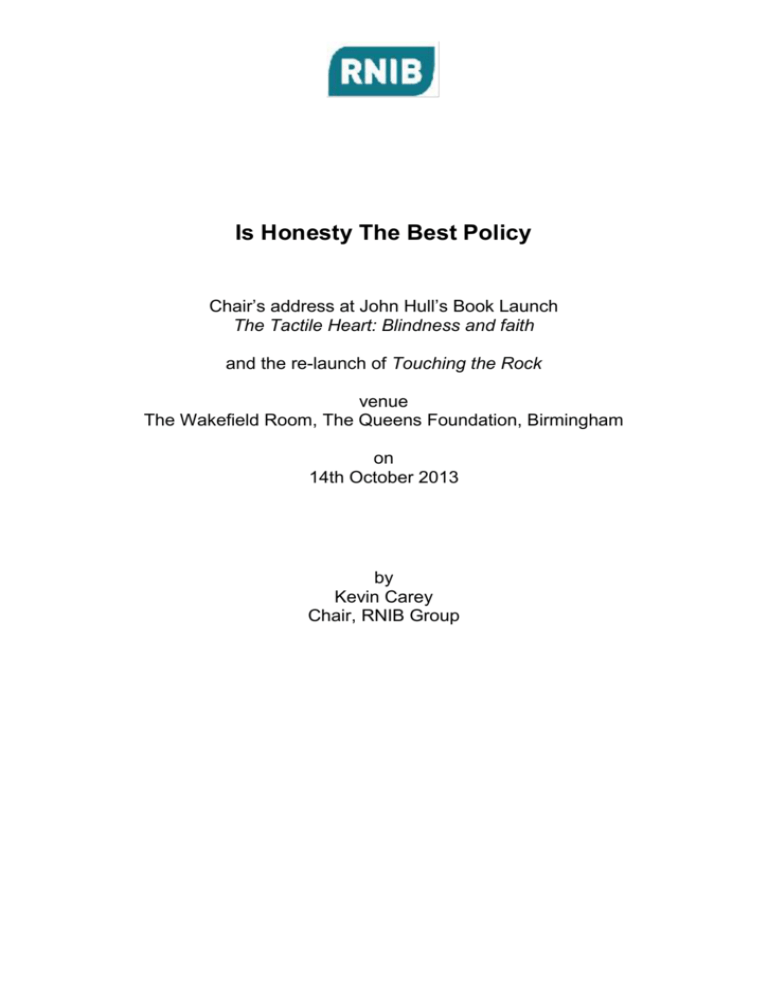
Is Honesty The Best Policy Chair’s address at John Hull’s Book Launch The Tactile Heart: Blindness and faith and the re-launch of Touching the Rock venue The Wakefield Room, The Queens Foundation, Birmingham on 14th October 2013 by Kevin Carey Chair, RNIB Group [Type text] I suppose, to put matters simply - too simply, perhaps - there are two extreme views on blindness and life, the first being that the blindness is simply an incidental inconvenience, the other that it is defining, not dissimilar to the discussion about whether religion should fundamentally inform what we do or should be seen as a purely private preoccupation. I tend to be at the integrationist end of both of these spectra, affirming that my own blindness has had a profound effect on every aspect of my life, and that there is no point in a religion that isn't fundamentally public. On the one hand, not being able to see has a seriously limiting effect on what I can and can't say as a novelist; on the other, it seems anomalous at the very least to argue that you can love your neighbour in private. John Hull has brought these debates to an intense pitch in his new book being launched today. He is not a theologian who happens to be blind, addressing himself to God, he is a blind theologian lodging a serious complaint and it is a complaint in the public sphere, not some private spat with the almighty; and what John argues should have a lasting effect on the way we view physical impairment, whether we are people of belief or atheists, or too idle to be either. If we look at the history of Christianity and disability we will see that the piety and cure paradigm has been immensely powerful and of course, in its way, seriously impairing; for every Milton there are a million mendicants languishing in a tepid pool of pity and watered-down gruel, producing a heavily skewed dichotomy of heroism and impotence. This is our lot and it is what was laid upon us, if not by Jesus himself, by the Evangelists whose word, we are told, is the Word of God. Behind this deeply troubling layer of argument there is a more fundamental assumption in John's writing which is of immense contemporary relevance. During the period 2005-10 I was a Member of the Church of England General Synod and during the debates on women bishops I was in the tactical engine room, a somewhat grubby location in a world of supposed Christian charity, primarily telling people what not to say or even advising total silence on some points, and one of the main arguments against us from both the extreme Catholics and the extreme Evangelicals was that we were advancing the claims of women on the mere grounds of equality and social justice which were trumped, depending on your point of view, by a doctrine of male headship on the one hand and physical male representationality on the other. Now trust me, I'm a theologian: Jesus has nothing whatsoever to say about either male headship or male representationality: he would, as a man, have assumed the first in a general way and he wouldn't have understood the second; but what is absolutely clear is the commitment of Jesus to equal concern and respect and to social justice. John argues, however, that we would all have been better off if Jesus had recruited some followers with physical or cognitive impairments rather than first curing them and then letting them into the inner circle. I get the point, in terms of the contemporary language of role model, but I think the argument at the deeper level of social justice is more important. RCH1307 Book Launch Address, Birmingham 14.10.13 Final Kevin Carey, Chair, RNIB Group Page 2/4 [Type text] I said in an earlier review of The Tactile Heart that "It is highly unusual in this Laodician - neither hot nor cold - postmodern age to encounter a missile of blazing passion guided by cold, forensic, calculation; but the enterprise is daring and the combination is deadly" for which, if my own experience is anything to go by, John will not be easily nor quickly forgiven. For we live in an age which, in spite of burgeoning higher education, is sadly lacking in forensic skills and which, in spite of ever more extreme entertainment, has very little understanding of passion. And, as if that were not enough, this combination of qualities strikes a horribly jarring chord when the judgment is delivered by blind people on the seeing. Whatever makes us all different, blind people have this in common: that, lacking the incessant input of circumstantial stimuli, we tend towards the abstract which can make us sound very harsh; but that same internalisation and concentration tends to make us passionate. But our postmodern age is one which, for lack of forensic skills and passion, is almost incapable of making a sensible decision about anything. Whether we are thinking about the vastly exaggerated and unscientific claims of neo Darwinian new atheists or the un-rooted ranting’s of the Tea Party movement, we are now almost beyond the capacity of the social imagination to empathise with the other. Which brings me back to where I began because I would argue that it is my very detachedness from the incidental, brought about by my blindness, which gives me the forensic capacity which opponents resent; and it is my passion, born of the ability to focus emotion, which offends what people would characterise as nuance but which is, in almost all cases, intellectual and, worse still, moral cowardice. But, for all its potential enemies, I would most of all warn John against this book's friends. As that great poet and quasi theologian T. S. Eliot says in Murder in the Cathedral: "The last temptation is the greatest treason, to do the right thing for the wrong reason" but I fear it is often the first temptation. There is no safer sanctuary for the sentimental than a lazy church and so there will be many accolades for John's book simply because it is a piece of advocacy by a person with an impairment for people with impairments; but if you really want to know whether this means anything just count the number of people with impairments the next time you go to church. I don't claim it is much better anywhere else but most places are less suspect because they make more modest claims. We are used to a society where our rights expand with every year but our enjoyment of them contracts. And all of these considerations lead to the question of how we can have an honest conversation about blindness unless thought leaders like John are prepared to be honest. Perhaps the blindness institutions that remain are the last bastions of the stiff upper lip but that attitude is only of assistance to those who want to be comforted with the thought that as long as we are neat on parade there isn't much that they need to do; but this is corrosively collusive behaviour. I once asked the question: if you're about to negotiate a deal with a civil servant, is the power relationship altered if you ask him before the meeting to show you to the toilet? My answer was that if the two parties were women it would probably be all right but if they were men then the power relationship would be radically altered, which explains why my kidneys are so heavily over-taxed. If we are not prepared to be brutally honest about blindness, then the world will take us at our word, for its own convenience. This is why John's writing is so important and why it is vital that his new book, like Touching the Rock, is picked up and read outside theological circles for while we do need a theology of impairment we also need the wider capacity to understand it in an imaginative RCH1307 Book Launch Address, Birmingham 14.10.13 Final Kevin Carey, Chair, RNIB Group Page 3/4 [Type text] context; the recent egregious failures in caring for the sick, elderly and impaired has less to do, I think, with a lack of compassion than with the lack of imagination and emotional engagement which is a necessary pre-requisite of compassion; we must, in some way, be forgiven our trespasses as we forgive them that trespass against us; but repetition is unforgivable. In conclusion, then, I simply want to thank John for being an important contributor to what has been, to date, a somewhat distanced engagement with important issues. There may be a place for the statistical approximations of sociology and for the rational organisation of what we have wrongly persuaded ourselves are limited public sector resources but we would do far better, it seems to me, to engage with the larger complexities, and even mysteries, of who we are and why we are here. John Hull dares to ask but do we have the courage to answer? RCH1307 Book Launch Address, Birmingham 14.10.13 Final Kevin Carey, Chair, RNIB Group Page 4/4
